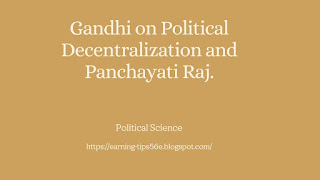Gandhi on Political Decentralization and Panchayati Raj.

Gandhi on Political Decentralization and Panchayati Raj.

Gandhiji's concept of Decentralization sprang from his urge for moral and spiritual uplift. For, he equated human happiness with, mental and spiritual growth and this, according to him, could be achieved under decentralization. Decentralization could not take place in a violent society. Obviously, Gandhi stood for non-violent society so that decentralization could work. He was also opposed to centralisation on the ground that centralisation could not be sustained and defended without application of coercion.
Gandhi thought that individual liberty and non-violence could not function a centralised political order. He, therefore, advocated decentralisation of power which was the core of Gandhian ideas. He opposed centralisation on the ground that centralisation stood for concentration of power in the hands of a few depriving the mass of the people from the participation in the affairs of the state. Centralisation made man depersonalised and devoid of human dignity. In the opinion of Gandhi, decentralisation acted as an antidote to alienation because the system of decentralisation kept the people involved in the exercise of functions at the various stages.
In the operative part of the principle of decentralisation, Gandhi pleaded for power to the people, which was only possible if small communities of villages were formed. Here he stood for Panchayati Raj where democracy functioned from below. Ancient self-governing institutions of India had virtually disappeared under the too centralised administration of British rule. Gandhi wanted to revive and develop local self-governing institutions by the establishment of Panchayati Raj. He held that highly centralised form of parliamentary democracy was contrary to the economic, social and religious nature of India. The organisation of village life and autonomy of local communities were more important than democracy at the top through adoption of parliamentary democracy. He wanted democracy at the grass-root starting from below through the functioning of Panchayats.
Gandhi's idea of Panchayati Raj represents a system of a complete decentralisation of political power. a Panchayat is a complete Republic independent of its neighbours and yet a dependent in many areas in which dependence is essential for the good of all. The Panchayats will have executive, legislature and judiciary authorised to exert authority over jurisdiction specified. Panchayat will be a perfect village government based on perfect democracy. The village people are the architect of their respective village government known as Panchayat. The law of non-violence and individual freedom rule the individual in the running of this government. In the exercise of political power the decentralisation of power through the Panchayats does not suggest change of personnel only, but change in the basic system and method: To many scholars it appears that decentralisation of power is a reflection of anarchism. But Gandhian approach to the issue is that greater decentralisation leads to greater power to Panchayats and betterment for the people. Gandhi's strong advocacy for decentralisation is an answer to the modern State which has assumed the form of a Leviathan.
In fact, Gandhi's view on decentralisation leading to the establishment of Panchayat is an expression of his urge for rural reconstruction and revival of village economy based on-governing and self sustaining villages having autonomy. Political and economic decentralisation is the essence of such system which aims at reconstruction of villages through the revival of indigenous and traditional industries.


0 Comments